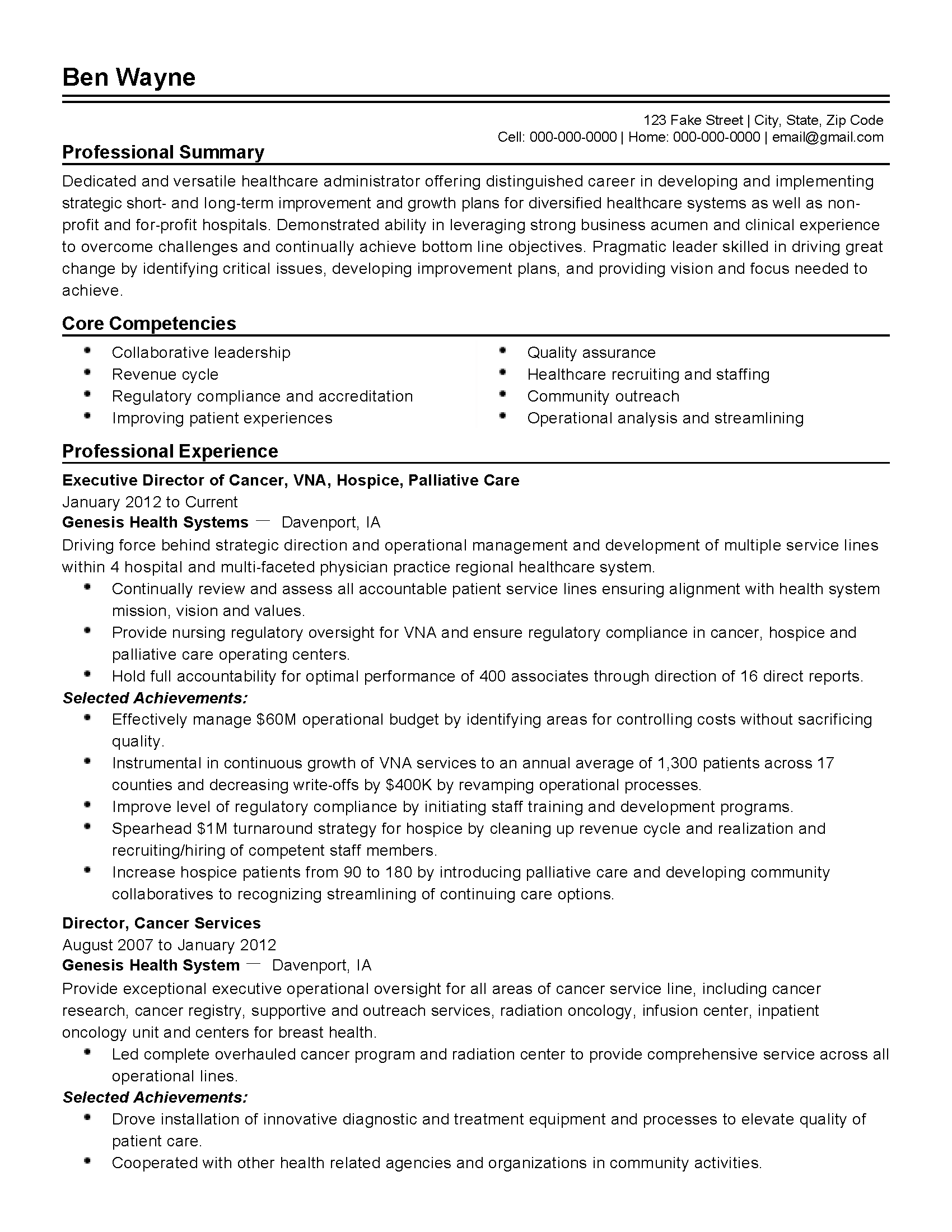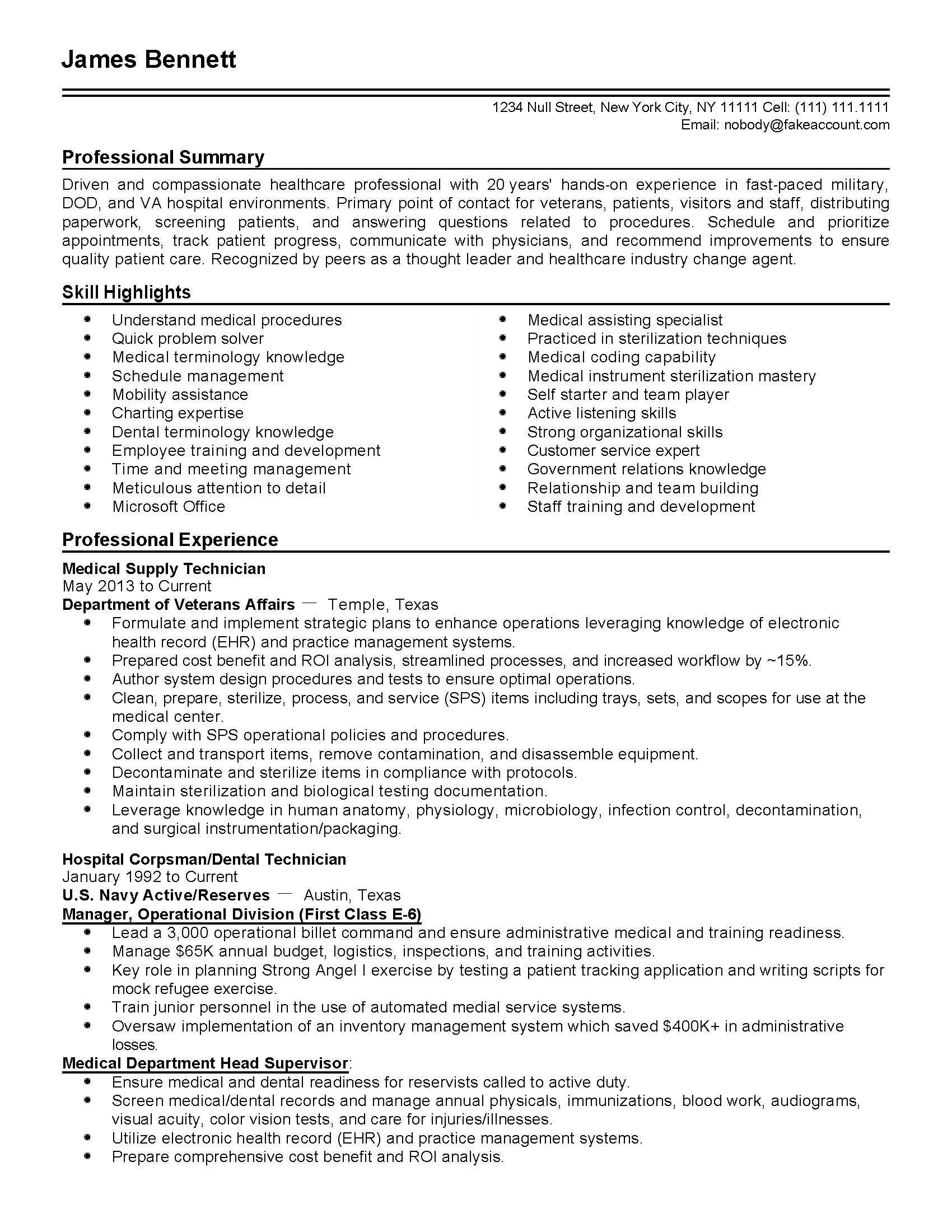Why this resume works
- Highlights industry-specific skills: The job seeker emphasizes healthcare skills in the bullet points for previous roles, showcasing expertise in patient record management and insurance claim processing.
- Quantifies accomplishments: By quantifying accomplishments such as reducing admin time by 20% and improving claim processing by 30%, the resume clearly shows the job seeker’s many high-impact contributions.
- Uses action-oriented language: Action verbs like managed, coordinated, and streamlined engage the reader and showcase impressive efforts to enhance operational efficiency and patient care.
More Healthcare Support Administrator Resume Examples
Explore the examples below to better highlight your skills and experiences. These healthcare support resume examples will guide you in creating a resume that emphasizes your expertise and value in the healthcare field.
Personal Support Worker
Why this resume works
- Highlights language proficiency: The resume clearly presents the candidate’s multilingual abilities, noting Beginner (A1) proficiency in English, French, and Spanish, demonstrating their ability to communicate across diverse healthcare settings.
- Effective use of keywords: Strategically placed keywords like patient care, medication administration, and emergency response ensure the resume aligns well with ATS requirements for healthcare roles.
- Shows digital literacy: Although specific digital tools aren’t named, meticulous management of medication schedules and patient care plans suggests strong proficiency in relevant healthcare-related computer skills.
Medical Assistant
Why this resume works
- Includes mix of soft and hard skills: The resume highlights a well-rounded skill set, blending technical abilities like medical record maintenance with interpersonal skills such as patient education.
- Demonstrates language abilities: Language skills in English, Spanish, and French underscore the candidate’s capability to communicate across cultures, enhancing their effectiveness in diverse healthcare settings.
- Displays technical expertise: Technical expertise is evident through specialized skills in surgical assistance and medical software training, vital for maintaining high standards in medical environments.
Companion Caregiver
Why this resume works
- Showcases impressive accomplishments: The resume effectively showcases accomplishments, such as improving patient satisfaction by 20% and reducing medication errors by 10%, highlighting the candidate’s senior-level impact.
- Lists relevant certifications: Listing certifications on your resume like Certified Nursing Assistant and CPR clearly demonstrates the candidate’s expertise and commitment to continuous learning in healthcare.
- Emphasizes leadership skills: Leadership skills are emphasized through achievements like organizing activities that increased engagement by 30% and providing daily care to 10+ elderly clients.
Healthcare Support Administrator Resume Template (Text Version)
Min Kim
Detroit, MI 48212
(555)555-5555
Min.Kim@example.com
Professional Summary
Experienced healthcare support administrator with a proven record of enhancing patient care and administrative efficiency. Skilled in patient coordination, medical records management, and team leadership. Dedicated to optimizing workflow and reducing operational costs.
Work History
Healthcare Support Administrator
Riverside Medical Group – Detroit, MI
March 2023 – March 2025
- Managed 150+ patient records updating daily info
- Coordinated patient schedules optimizing appointments by 25%
- Improved insurance claim processing time by 30%
Healthcare Operations Specialist
Harmony Health Center – Southgate, MI
March 2021 – March 2023
- Streamlined workflow, reducing admin time by 20%
- Monitored inventory, reducing costs by 15%
- Led a team of 5 to enhance patient care services
Medical Administrative Assistant
Meadowbrook Clinic – Detroit, MI
March 2019 – March 2021
- Assisted in patient admission processes and documentation
- Maintained medical records for 200+ patients
- Scheduled and confirmed patient appointments efficiently
Languages
- English – Beginner (A1)
- Spanish – Beginner (A1)
- French – Intermediate (B1)
Skills
- Healthcare Administration
- Patient Coordination
- Medical Records Management
- Insurance Claims Processing
- Inventory Management
- Team Leadership
- Scheduling and Appointments
- Workflow Optimization
Certifications
- Certified Healthcare Administrative Professional – Health Administration Certification Board
- Certified Medical Office Manager – Practice Management Institute
Education
Master’s Degree Healthcare Administration
University of California, Los Angeles Los Angeles, CA
May 2019
Bachelor’s Degree Health Services Management
California State University Los Angeles, CA
May 2017
Related Resume Guides
Advice for Writing Your Healthcare Support Administrator Resume
Writing a resume for a healthcare support administrator job doesn’t have to be stressful. We’ll show you how to make a resume that highlights your administrative skills and your role in keeping healthcare teams running smoothly. Ready to make your resume stand out? Let’s get to it!
Write a strong professional summary
A professional summary is a concise statement at the beginning of your resume that showcases your main skills, experiences, and achievements to catch the employer’s eye and create a strong first impression. For seasoned professionals, this section should encapsulate their career successes and relevant expertise.
On the other hand, entry-level candidates or those with limited work experience may find a resume objective better fits their needs. An objective statement outlines your career aspirations and conveys enthusiasm for the position.
As a healthcare support administrator, focus on action-oriented language to highlight your organizational abilities, proficiency in managing patient records, and capability to support healthcare teams effectively. Begin by listing your most relevant experiences and skills and emphasize a couple of specific accomplishments like boosting office efficiency or improving patient satisfaction.
Healthcare support administrator resume summary examples
Entry-level
Recent Health Administration graduate with a Bachelor’s degree in Healthcare Management and certification in Medical Office Administration. Proficient in electronic health records (EHR) systems, patient scheduling, and medical billing. Demonstrates strong organizational skills and a passion for supporting healthcare teams to improve patient care services.
Mid-career
Experienced healthcare support administrator with over 6 years of experience managing administrative operations in hospital settings. Adept at coordinating patient intake processes, managing medical records, and ensuring compliance with healthcare regulations. Recognized for enhancing office efficiency through process improvements and exceptional communication skills.
Experienced
Highly skilled healthcare support administrator with 15+ years of experience overseeing administrative functions in diverse healthcare environments. Expertise in team leadership, strategic planning, and implementation of advanced EHR systems. Proven track record of driving operational excellence and improving patient satisfaction scores through innovative administrative solutions.
Healthcare support administrator resume objective examples
Recent graduate
Recent graduate with a Bachelor’s degree in Health Administration, eager to start a career as a healthcare support administrator. Possess strong organizational and communication skills, along with hands-on internship experience in healthcare settings. Dedicated to improving patient care services and ensuring efficient administrative operations.
Career changer
Detail-oriented professional with a background in customer service transitioning into the role of healthcare support administrator. Bringing exceptional problem-solving abilities and a passion for helping others, seeking to leverage transferable skills to enhance administrative support and contribute positively to patient satisfaction in a healthcare environment.
Specialized training
Certified Medical Administrative Assistant (CMAA) with specialized training in electronic health records management, looking for an entry-level position as a healthcare support administrator. Committed to utilizing technical expertise and administrative skills to streamline office procedures, facilitate effective communication among healthcare providers, and enhance overall patient care experience.
Use our Resume Builder to quickly create a polished healthcare support administrator resume. It helps you organize your skills and experience easily.
Include relevant certifications and training
Creating a dedicated Certifications section on your resume is crucial, especially for a healthcare support administrator. Listing certifications, licenses, and specialized training shows employers that you have the necessary skills and knowledge to excel in your role. These credentials validate your expertise and can set you apart from other candidates.
To complete this subsection effectively, start with a clear heading like Certifications. Here are some examples of relevant certifications:
- Certified Medical Administrative Assistant (CMAA)
- Certified Healthcare Administrative Professional (cHAP)
- Certified Professional Coder (CPC)
- Electronic Health Records Specialist Certification (CEHRS)
- Certified Medical Office Manager (CMOM)
On your resume, list each certification prominently, including the full name of the credential, the issuing organization, and the date obtained or expiration if applicable. Let’s see what that looks like.
Example of a certifications section
Certified Medical Administrative Assistant (CMAA)
Issued by: National Healthcareer Association (NHA)
Expires 2025
Certified Electronic Health Records Specialist (CEHRS)
Issued by: National Healthcareer Association (NHA)
Issued 2022
Basic Life Support (BLS) for Healthcare Providers
Issued by: American Heart Association (AHA)
Expires 2023
Health Information Management (HIM) Certification
Issued by: American Health Information Management Association (AHIMA)
Issued 2021
Certified Professional in Healthcare Quality (CPHQ)
Issued by: National Association for Healthcare Quality (NAHQ)
Expires 2024
A combination resume format is great if you need to highlight certifications upfront. It showcases your qualifications alongside your experience, making it clear you meet strict credential requirements right away.
Showcase your work experience
Highlighting your work experience on a resume is vital for a healthcare support administrator role. This section allows employers to quickly see how your background and skills match the job requirements. Arrange your work history in reverse chronological order to spotlight your most recent and relevant roles first, including job title, employer name, location, and employment dates.
Use concise, action-oriented bullet points to detail your responsibilities and achievements. For instance, rather than saying “handled patient records,” say “managed patient records efficiently, ensuring 100% accuracy.” Emphasize measurable outcomes like a “30% reduction in errors.”
List core responsibilities essential for a healthcare support administrator. By concentrating on these areas and demonstrating specific achievements or improvements from past roles, you highlight your ability to excel in this position.
5 healthcare support administrator work history bullet points
- Managed patient scheduling and coordinated with medical staff to improve appointment adherence by 25%.
- Implemented a new electronic health record (EHR) system, reducing documentation errors by 40% and speeding up patient intake processes.
- Trained and supervised a team of 10 administrative assistants, enhancing overall office productivity by 15%.
- Streamlined billing procedures, resulting in a 20% increase in on-time payments from patients.
- Developed and maintained relationships with healthcare providers, improving referral processing time by 30%.
To pass ATS and get noticed by recruiters, include the most prominent keywords from the job posting in your resume.
Match your resume with the job description
It’s important to customize your resume to align with the job description. This approach demonstrates that you are a strong candidate for the healthcare support administrator role. Employers often use Applicant Tracking Systems (ATS) to scan resumes for relevant keywords and phrases, so an ats-friendly resume is essential to ensure your application is seen by a human.
Start by carefully reading the job posting to identify key terms like patient scheduling, record management, or customer service. Make sure these keywords are included in your resume. For instance, if the job posting mentions “Manage patient records and ensure accuracy,” you could write: “Managed patient records with high attention to detail, ensuring accuracy and confidentiality.”
Use our ATS Resume Checker to help your resume get noticed. It finds problems and gives advice so your resume can pass through systems that companies use to pick top candidates.
FAQ
Do I need to include a cover letter with my healthcare support administrator resume?
Writing a cover letter for a healthcare support administrator role is a great idea. Cover letters help you show your enthusiasm for the role and explain how your skills match the job’s needs. In your cover letter, you can highlight your experience in managing patient records, coordinating with medical staff, and handling administrative tasks efficiently.
You can also mention specific accomplishments or projects related to the position. For instance, if you’ve implemented a new scheduling system that improved clinic efficiency, this is a good place to share it.
In short, a cover letter adds a personal touch to your application and can help you stand out as a dedicated candidate. Check out some cover letter examples or use our Cover Letter Generator to get started.
How long should a healthcare support administrator’s resume be?
A healthcare support administrator’s resume should generally be one page to keep your qualifications and experience concise for hiring managers, as noted in our resume length guide.
If you have significant experience or many relevant achievements, a two-page resume is acceptable. Concentrate on recent positions and emphasize skills specific to healthcare administration like patient coordination, medical record management, and communication with healthcare professionals.
How do you write a healthcare support administrator resume with no experience?
For those writing a resume with no experience, emphasize your skills, education, and any pertinent training to show your readiness for the position.
Here are some tips for crafting an entry-level resume:
- Start with your educational background: Include details about your degree or certification in healthcare administration or a related field, the institution’s name, graduation date, and notable coursework or honors.
- Focus on transferable skills: Highlight soft skills such as organization, communication, and attention to detail.
- Mention relevant training: List any workshops, online courses, or certifications (e.g., HIPAA compliance) that enhance your resume.
- Include volunteer work: If you have volunteered at hospitals or clinics, specify tasks like scheduling appointments or maintaining patient records that demonstrate your suitability for administrative roles.
Customize each resume by incorporating keywords from the job description and emphasizing how your background aligns with the role’s requirements.
Rate this article
Healthcare Support Administrator
Additional Resources

Healthcare System Administrator Resume Examples & Templates
Ben Wayne Professional Summary 123 Fake Street | City, State, Zip Code Cell: 000-000-0000 | Home: 000-000-0000 | email@email.com Dedicated and versatile healthcare administrator offering distinguished career in developing and implementing strategic short-

Military Healthcare Administrator Resume Example
James Bennett 123 Fake Street, City, State, Zip Code Cell: 000-000-0000 Email: email@email.comProfessional Summary Driven and compassionate healthcare professional with 20 years' hands-on experience in fast-paced military, DOD, and VA hospital environments.

Healthcare Support Cover Letter Examples & Templates
Healthcare support provides assistance to doctors and nurses while providing emotional support to patients and their families. Your role is as much technical as it is interpersonal. An efficient healthcare

Caregivers Companions Cover Letter Example & Templates
Caregivers companions allow the disadvantaged to maintain a sense of dignity. These unfortunate individuals can be the sick or elderly, or the disabled. What they all have in common is

Home Health Aide Cover Letter Example & Templates
A home health aide cover letter carefully delineates a candidate’s experience living in homes or working in assisted communities. They provide assistance with the resident’s daily living. Depending on the

Medical Biller Cover Letter Example & Templates
As you have noted from the free medical biller cover letter sample, a strong cover letter emphasizes skills that are relevant to the position you are applying for. Medical billers
